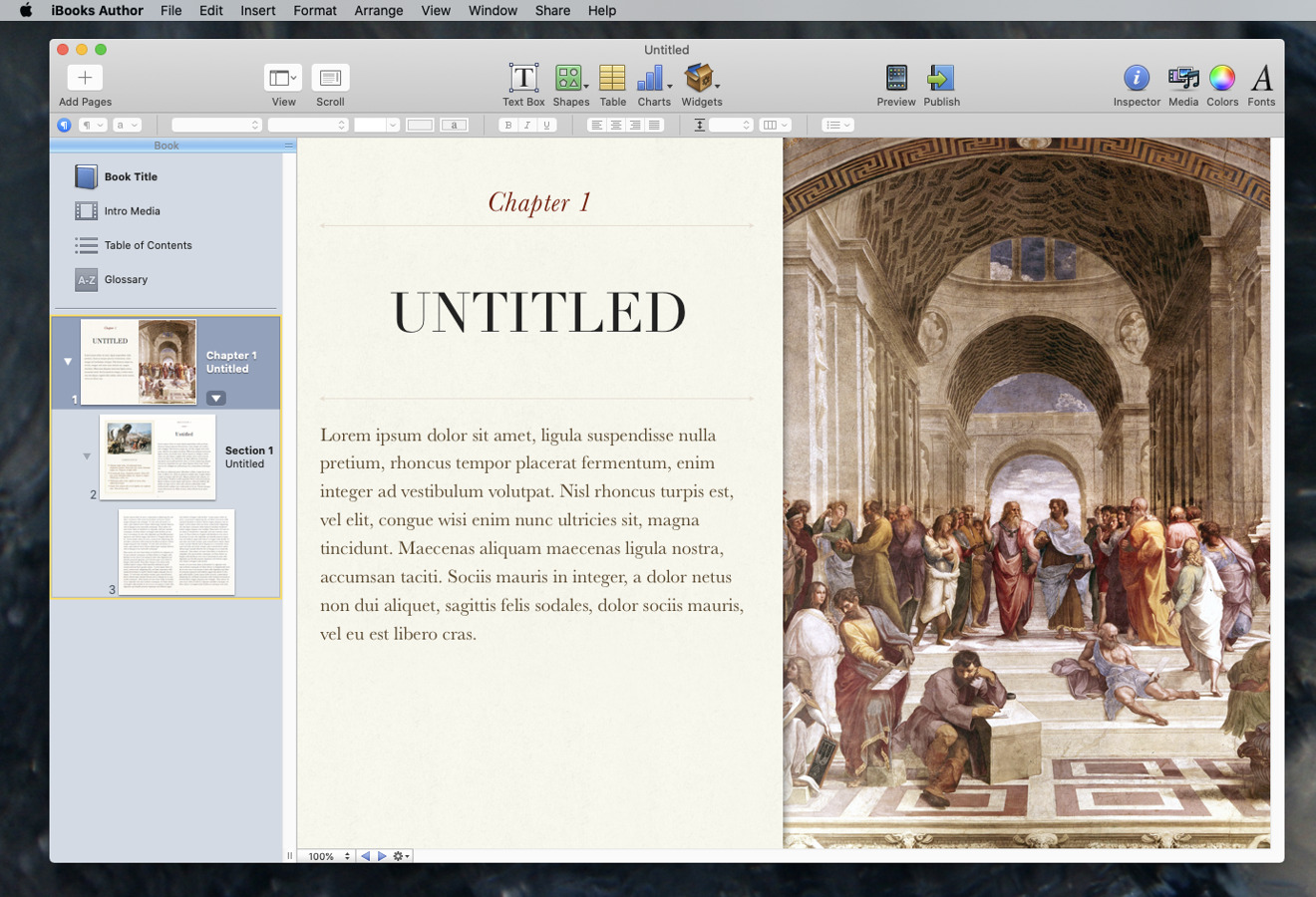Eight years after it released tools to make what were then called iBooks, Apple has launched Apple Books for Authors, a new effort to get writers publishing on its platform.
Back when it was trying to establish the iPad, and back before it unfairly lost a $450 million lawsuit over alleged book price fixing, Apple had hopes of becoming the premier e-book service. It had a lot on its side, too, starting with how Apple iBooks simply looked better than Amazon's Kindle titles.
Unfortunately, Amazon had a big head start. By the time Apple announced its iBooks service alongside the iPad in January 2010, Kindle had already been around for three years.
Kindle had already become the Hoover of vacuum cleaners, or the Biro of pens. More people talked about reading on their Kindle than they did about buying e-books.
Then producing books for Kindle was reasonably simple — reasonably — whether you were an established publisher or an individual author. While there was and is more to it, broadly if you can produce a PDF of your book, you can publish it.
That made and continues to make it quick to produce Kindle books, but it also means that Amazon's platform is basic. Apple set out to reinvent the e-book experience, starting with readers, but then in 2012 with authors too.
The last time Apple tried to attract authors
Originally called iBooks Author, Apple's app was capable of producing PDFs for Kindle, but it was really set on making gorgeous books for its own platform. The app's ability to give authors everything from better typographical controls, to embedding video, was superb. It truly left Kindle in the dust.
Except it was also buggy. Even though it had taken Apple two years to get the app released, authors repeatedly found that it would crash. If you added too much video, if you used too many features, iBooks Author would creak and fail.
Doubtlessly, that tool has been improved over the years, but unfortunately few people will have noticed because not very many stuck with it. The artistry and the capability of Apple iBooks was beaten by the sheer ubiquity of Kindle.
Apple does not release any figures so it's not possible to even realistically guess how many books are on the service compared to Kindle. But anecdotally, it has long been true that if you want a particular title, it is certain to be on Kindle — and only possibly also on Apple Books.
If you're an author, you might well still read what are now called Apple Books, and appreciate that they do look better. It's just now so rare to commit to creating books solely for the Apple Books Store that Apple's app is all but forgotten.
Apple's iBooks Author still lives on
That's very unfair, but even today as Apple launches Apple Books for Authors, its renewed effort to attract authors does not mean it's improved its software tools. Dishearteningly, the app is even still called iBooks Author.
 This is what Apple's iBooks Author app looks like today — and looked like when it launched in 2012, too.
This is what Apple's iBooks Author app looks like today — and looked like when it launched in 2012, too.It has been updated since Apple renamed the service from iBooks to just Books back in 2018, but not noticeably so. Apple's iBooks Author is currently on version 2.6.1, and that update came a year ago.
The release before, 2.6, was two years ago, and 2.5 was three years ago. It's not as if any of these updates are significant either, so this is not the cutting-edge tool it even was originally.
What Apple is doing with its new Apple Books for Authors initiative is only partly about the tools to do it. Alongside its own authoring tool, Apple is now promoting Pages as the place to "create stunning books," and Microsoft Word as an also-ran.
Apple does mention alternatives, such as its own Notes app, but also significantly the third-party Scrivener. That's a compelling tool for writers, both for how it helps you manage writing large books, and it is so good, so popular, that it would look peculiar if Apple hadn't mentioned it.
It seems just as peculiar that the new promotion doesn't mention Vellum. Vellum is beautifully designed app and service for creating e-books and print titles, and it's made by ex-Apple designers.
Apple offers advice
The tools Apple does mention are a very small part of the new Apple Books for Authors offering. They're a footnote in a section called "Write Your Book," which concentrates much more on finding inspiration.
This section is like Apple dipping a toe into the Masterclass format. Established authors, such as Dani Shapiro and Walter Mosley, talk directly to camera about issues to do with writing.
They're well-shot, well-made, and the authors are interesting. But where Masterclass has, say, Aaron Sorkin talking for around three hours, each of the few Apple Books for Authors videos so far is two minutes long.
Where Apple Books for Authors does much better is in the detail of what happens after writing. It has sections on preparing your book for publication, then publishing it, and also what happens afterwards with marketing and sales and reporting.
It's true that publishing on Kindle is easy, but it isn't true that it's immediately obvious how to do it. There are lots of steps and most individual authors who publish on it get there through repeated trial and error, and much discussion on Amazon support forums.
Apple, by comparison, now provides a great deal of information about each step of the process. It's all written in typically understandable Apple style, and features videos for the more head-scratching parts such as working with the iTunes Connect service for publishing.
Where Apple Books wins
Apple's new service is heavy on helpful advice, but it doesn't skimp on promoting itself. In about the only direct reference to Kindle, Apple has a table listing all the reasons why it is better.
It's one of those tables that has many categories, with ticks for Apple and, of course, crosses for Kindle. This is canted toward Apple, naturally, but its points are fair.
For instance, it points out that Apple does not charge authors or publishers for delivering ebooks to readers. This has always been a bit of a nonsense that Kindle does, and it dates back to the early days when Amazon found some way to charge for transmitting a book to your Kindle hardware device.
Then with what might be a clenched-jaw nod to the old lawsuit, Apple Books for Authors makes a point of saying that it does not do price matching — and that Kindle does.
Will Apple Books for Authors work?
Apple Books for Authors could do with more author videos, as the ones so far are short enough that they feel insubstantial. Apple could do with a major revamp to iBooks Author, or perhaps it could simply drop it entirely and concentrate on Pages.
Aside from that, what the new promotion brings is just this — promotion. It is a strong advertisement for Apple Books, and it offers genuinely useful advice and information.
Right now it seems like a bold, if perhaps fruitless, second attempt to take on Kindle.
Times have changed. Ebooks are no longer killing print titles, at least not so overwhelmingly. The Apple of 2020 is not the same as the Apple of 2010 in terms of how many people — and which market segments — use its equipment.
If Apple is gambling that there are so many more people using Macs and iOS that it can try pushing its authoring tools and services again, it might be right. It might be that this time around, Apple Books doesn't have to actually beat Kindle, just provide a big enough book store that it's worth authors working in it.
Keep up with AppleInsider by downloading the AppleInsider app for iOS, and follow us on YouTube, Twitter @appleinsider and Facebook for live, late-breaking coverage. You can also check out our official Instagram account for exclusive photos.
 William Gallagher
William Gallagher









-m.jpg)






 Christine McKee
Christine McKee
 Charles Martin
Charles Martin
 Mike Wuerthele
Mike Wuerthele
 Marko Zivkovic
Marko Zivkovic
 Malcolm Owen
Malcolm Owen




-m.jpg)






21 Comments
I might have to look at this. This morning, fed up with How Amazon treats its customers, workers, the environment, and on and on I pulled all of my books off of Amazon. So I’m looking for a new platform. This kight be the way to go, but it’s not the only one.
I have no idea why they carry on with iBooks Author. They haven't even bothered to update the name.
And yes, Vellum is the easiest way to put a great looking book on Apple Books, Kindle and Print. No idea why it didn't get a spot on their site.
Hey Apple: iBooks Author is DOA. Kindle runs on everything. Your platform is too much trouble for a very small market.
Vellum is the most over-hyped style-over-substance app I've ever seen in the publishing industry. And at $200? Laughable. It's truly been created for the Apple fan.
Scrivener for Mac or Windows absolutely annihilates it. Scrivener does everything Vellum can do as well as being a full WP. And it costs a fraction of Vellum.